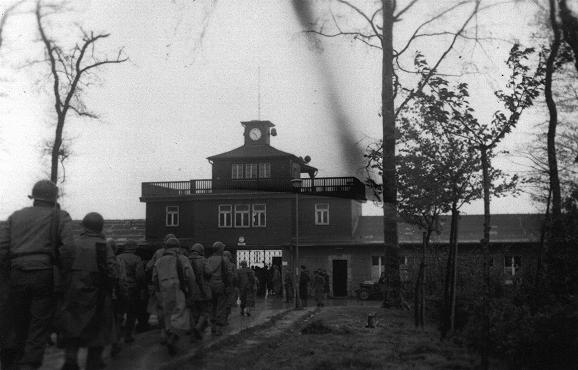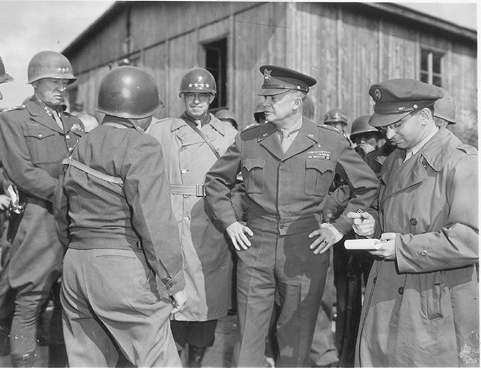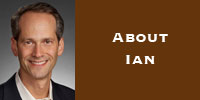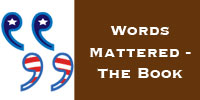“For I propose to tell you of Buchenwald.” – Edward R. Murrow, April 15, 1945
Five miles from the east-central German city of Weimar, famed as the center of post-World War I German democracy and as the home of German philosopher and writer Johann von Goethe, stood the World War II-era Buchenwald concentration camp.
Buchenwald was one of the larger concentration camps in Nazi Germany’s system of murderous repression. It was initially created in the 1930s as a forced labor camp producing ammunition and munitions that was populated with political prisoners and Jews, though others including criminals, Gypsies, Jehovah’s Witnesses, and prisoners of war soon joined them.
By February 1945, Buchenwald had encountered a surge in inmates due to the forced evacuation of thousands (many of whom died in the journey) west from the Auschwitz death camp in Poland, which was spurred by the Soviet advance into that area. Like other camps, Buchenwald featured widespread disease such as typhus, indiscriminate killings, starvation, torturous experiments, and mass crematoriums that eventually could not keep pace with the dead.
 In the early Spring of 1945, the American Army was marching eastward across Germany, leading to a frenzied German evacuation of over half of the estimated 50,000 inmates still at Buchenwald. Over a third of those who were evacuated died. However, many inmates, encouraged by the sound of American artillery fire that was growing louder as it moved closer, refused to evacuate by resisting or hiding.
In the early Spring of 1945, the American Army was marching eastward across Germany, leading to a frenzied German evacuation of over half of the estimated 50,000 inmates still at Buchenwald. Over a third of those who were evacuated died. However, many inmates, encouraged by the sound of American artillery fire that was growing louder as it moved closer, refused to evacuate by resisting or hiding.
On April 11, the U.S. Army reached the gates of Buchenwald and liberated approximately 21,000 inmates, many of whom had already seized control of the camp. Despite their weak, and often near-death state, some of the survivors tried to lift their stunned liberators onto their shoulders in gratitude. Among the liberated was then 16-year-old Elie Wiesel, who would later write a book, Night, about his experience immediately before and during his time in Buchenwald that would become a classic of literature. Weisel’s work advocating human rights led to his being awarded the Nobel Prize for Peace in 1986.
 Also present soon after the liberation was General Dwight Eisenhower (left, at Buchenwald) whose communications to General George Marshall in Washington reflect his astonishment with the depravity of the Nazis who created and ran Buchenwald as well as the complicity of local townspeople who claimed ignorance of what was occuring within the camps barriers. Eisenhower explained to Marshall that the conditions of “cruelty and bestiality were so overpowering as to leave me a bit sick” and he noted that even famously tough “[General George] Patton refused to enter” certain rooms at the camp. Eisenhower was so appalled by what he saw, that he insisted that Germans who lived nearby be led on tours of the catastrophic conditions many of them explained they did not know existed, despite the sickening stench that could be smelled for several miles. He also made arrangements for members of the media and Congress to come to Buchenwald to see for themselves “in order to be in a position to give first hand evidence of these things if ever, in the future, there develops a tendency to charge these allegations merely to ‘propaganda.'”
Also present soon after the liberation was General Dwight Eisenhower (left, at Buchenwald) whose communications to General George Marshall in Washington reflect his astonishment with the depravity of the Nazis who created and ran Buchenwald as well as the complicity of local townspeople who claimed ignorance of what was occuring within the camps barriers. Eisenhower explained to Marshall that the conditions of “cruelty and bestiality were so overpowering as to leave me a bit sick” and he noted that even famously tough “[General George] Patton refused to enter” certain rooms at the camp. Eisenhower was so appalled by what he saw, that he insisted that Germans who lived nearby be led on tours of the catastrophic conditions many of them explained they did not know existed, despite the sickening stench that could be smelled for several miles. He also made arrangements for members of the media and Congress to come to Buchenwald to see for themselves “in order to be in a position to give first hand evidence of these things if ever, in the future, there develops a tendency to charge these allegations merely to ‘propaganda.'”
Another prominent man from history whose presence at Buchenwald has left an indelible imprint on history was radio broadcaster Edward R. Murrow. Born on April 25, 1908 in Greensboro, North Carolina, Murrow gained notoriety as a CBS Radio broadcaster in 1940 with his eyewitness accounts of the German blitz of Great Britain, when his “This…is London” introductions led to the developing understanding of German aggression and British courage. Murrow is now widely viewed as a pioneering figure in broadcast journalism, revered for his courage, integrity, social responsibility, and professional excellence. Acclaimed journalist and historian David Halberstam said that Murrow was, “one of those rare legendary figures who was as good as his myth.”
Murrow’s CBS Radio broadcast from 65 years ago today, April 15, 1945, was a powerful and important eyewitness account of Nazi crimes and of the stark brutality of the Holocaust. At the time, few Americans had any grasp of the scope and degree of the brutality within Nazi concentration camps. Murrow’s broadcast changed that and his bearing witness to the conditions of Buchenwald, and by extension other camps, continue to serve as the highest testimony to truth.
Murrow began his broadcast:
Permit me to tell you what you would have seen and heard had you been with me on Thursday. It will not be pleasant listening. If you are at lunch or you have no appetite to hear what Germans have done, now is a good time to switch off the radio. For I propose to tell you about Buchenwald. It is on a small hill about four miles outside Wiemar and it was one of the largest concentration camps in Germany and it was built to last.
Later, Murrow continued to describe what he witnessed and to frame future understanding of this horrific historical episode:
We proceeded to the small courtyard. The wall was about eight feet high. It wall adjoined what had been a stable or garage. We entered. It was floored with concrete. There were two rows of bodies stacked up like cordwood. They were thin and very white. Some of the bodies were terribly bruised; though there seemed to be little flesh to bruise. Some had been shot through the head, but they bled but little. All except two were naked.
I tried to count them as best I could and arrived at the conclusion that all that was mortal of more than 500 men and boys lay there in two neat piles. There was a German trailer, which must have contained another 50, but it wasn’t possible to count them. The clothing was piled in a heap against the wall. It appeared that most of the men and boys had died of starvation; they had not been executed.
But the manner of death seemed unimportant. Murder had been done at Buchenwald. God alone knows how many men and boys have died there during the last 12 years. Thursday, I was told that there were more than 20,000 in the camp. There had been as many as 60,000. Where are they now?…
I pray you to believe what I have said about Buchenwald. I have reported what I saw and heard, but only part of it. For most of it, I have no words.
Dead men are plentiful in war, but the living dead, more than 20,000 of them in one camp, and the country around about was pleasing to the eye. And the Germans were well-fed and well- dressed. American trucks were rolling towards the rear, filled with prisoners. Soon, they would be eating American rations. As much of a meal as the men at Buchenwald received in four days.
If I have offended you by this rather mild account of Buchenwald, I’m not in the least sorry.





